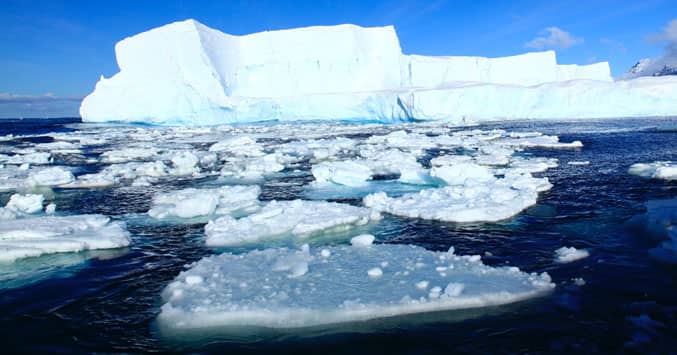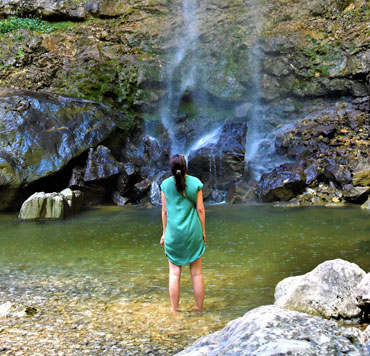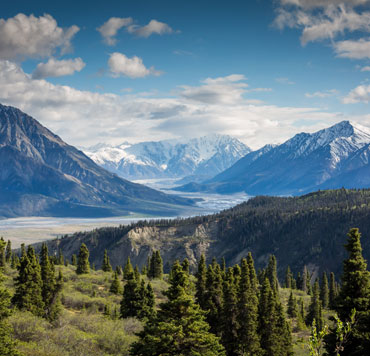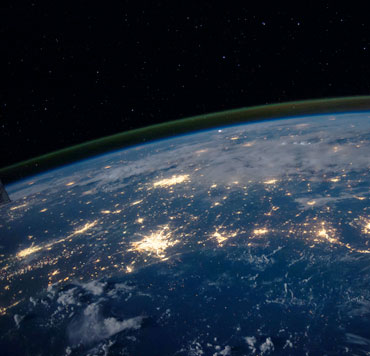
The earth…its land, air and oceans…are warmer. Right now, it’s like a low-grade fever. You know there’s a problem. You’re definitely not well. But the fever has not yet spiked to the point of rushing to the hospital. Not yet.
Given the complexities that have led to global warming, is there hope that our temperature can come down? Yes.
First, a quick review of what has led to a warmer planet and the consequences we’re experiencing.
The temperature in our atmosphere is about 59 degrees Fahrenheit, which is about 2 degrees warmer than in 1880.1
Climate scientist Katharine Hayhoe comments on the importance of this. Katharine was named by Time Magazine as one of the “Top 100 Influential People” and the United Nations awarded her as “Champion of the Earth” for Science and Innovation.2 She explains what is happening due to this rise in earth’s temperature:
“We aren’t seeing a change in the number of wildfires, but when they happen, it’s hotter and drier, and they are burning more area, which means they’re worse.
“We’re also seeing that our rainfall is more intense, because warmer air holds more water vapor, so when a storm comes along, there’s more water vapor to sweep up and dump on us today than there was just 50 or 100 years ago.
“We know along our coast that sea level is rising as glaciers melt.
“And we also know that hurricanes are getting stronger. They’re not more frequent, but they get their energy from warm ocean water. The oceans are warming and so they are intensifying faster, and they’re bigger and stronger.”3
 Climate scientists are 97% in agreement that the “greenhouse gases” of water vapor, carbon dioxide, methane, nitrous oxide and chlorofluorocarbons building up and trapped in our atmosphere, are causing this rise in average global temperatures and subsequent ramifications.4
Climate scientists are 97% in agreement that the “greenhouse gases” of water vapor, carbon dioxide, methane, nitrous oxide and chlorofluorocarbons building up and trapped in our atmosphere, are causing this rise in average global temperatures and subsequent ramifications.4
Among other causes, they point specifically to carbon dioxide as the main culprit, caused by humanity’s increased burning of fossil fuels. From it we get electricity, fuel for our cars and homes, steel, concrete, fertilizers, plastics and innumerable products that we use on a daily basis.
Carbon dioxide does not escape our atmosphere. Vegetation, soil and the ocean can absorb it (referred to as “carbon sinks”). However, beginning with the industrial revolution in the 1760s, the increased burning of fossil fuels simply poured too much carbon dioxide into the atmosphere for carbon sinks to remove it.
At the same time, forests were being cut down and areas of natural vegetation were replaced by urban expansion, reducing the earth’s ability to absorb carbon dioxide.
Greenhouse gases began building up in our atmosphere, trapping heat like a blanket around our earth.
This graph from the NOAA (National Oceanic and Atmospheric Administration) shows the gradual warming of the planet from 1880 to 2020.
The grey curved line on the chart shows the increase of carbon dioxide trapped in our atmosphere. It corresponds to the increase in the earth’s temperature, depicted by the red bars.
According to NOAA, “To put those changes in some historical context, the amount of rise in carbon dioxide levels since the late 1950s would naturally, in the context of past ice ages, have taken somewhere in the range of 5,000 to 20,000 years; we’ve managed to do it in about 60.”6
It is becoming abundantly apparent that we can no longer ignore global warming and its corresponding severe consequences of flooding, fires, rivers drying up, droughts, hurricanes and sea level rises.
Many scientists, businesses and governments worldwide are paying attention and working toward reducing carbon dioxide emissions and increasing its capture.
 Some of the advances are:
Some of the advances are:
As is true with any massive change in society, the change needed to reduce global warming will be difficult, costly and complex.
The burning of fossil fuels cannot abruptly stop. People require electricity, air conditioning, transportation and products which fossil fuels provide. The use of fossil fuels must continue while alternative energy sources are being developed to replace them.
Yet many who are convinced of the need to reduce carbon emissions are committed to the effort and innovation required. With action, it is still possible to reduce the buildup of greenhouse gases, bring the earth’s atmospheric temperature back into range, and quiet the intensely destructive weather spawned by a warmer earth.
Over history, humanity has faced challenge after challenge in combating diseases, creating transportation, communication systems, innovative production of goods and services. We are very creative beings, and it is because God made us to be creative, to inhabit some of his qualities as he made us in his image.
The photos brought back from the James Webb Space Telescope7 display once again the incredible creativity of our God.
 Its beauty and its distance (7500 light years away) remind us once again that Earth is not only a speck within our Milky Way Galaxy, but small beyond comprehension within the universe.
Its beauty and its distance (7500 light years away) remind us once again that Earth is not only a speck within our Milky Way Galaxy, but small beyond comprehension within the universe.
The Hubble Telescope of 1990 gave us an estimate of 170 billion galaxies in the universe. We will likely find out from the Webb Telescope the number of galaxies to be in the trillions.
The first sentence of the Bible reads, “In the beginning, God created the heavens and the earth.”8
Atmospheric scientist Katharine Hayhoe comments, “We are not designed to float around outer space like astronauts. We are designed to live on a planet that is perfectly suited for life, that gives us the air that we breathe…the water that we drink, the food that we eat and the materials that we use to make every single thing that we own….”9 Everything we need or that we develop today comes from what God already created on the earth.
 In addition to living here, we also have a special relationship, a responsibility in regards to the earth. When God created humanity he said to take care of every living thing that is on the earth. That includes animals, fish, birds, all the plants and people…because we are also living on earth.
In addition to living here, we also have a special relationship, a responsibility in regards to the earth. When God created humanity he said to take care of every living thing that is on the earth. That includes animals, fish, birds, all the plants and people…because we are also living on earth.
Jane Goodall, a conservation scientist famous for her study of chimpanzees, shares this poignant comment about humans:
“It’s bizarre that this most intellectual creature is destroying its only home. It seems to be a disconnect between this clever head and the human heart where we poetically seek love and compassion. I believe only when head and heart work in harmony can we attain our true human potential.”10
How then do we approach our earth? How are we to care for it? We did not create the earth. We simply showed up on it.
God gave it to us, in all of its beauty, to not only physically provide for us, but to feed our souls.
Dr. Francis Collins, a physician-geneticist and director of the Human Genome Project, said there are moments, sometimes through music or in nature, which “transport you into an intense spiritual place, that is both satisfying and also [generates] a longing which C.S. Lewis calls joy. Calling us not just physical creatures but spiritual creatures is merited because we seem to have this built into us.”11
 Studies have shown that as people spend time in nature it leads to increased creativity, joy, peace and refreshment. Nature is both calming and rejuvenating.
Studies have shown that as people spend time in nature it leads to increased creativity, joy, peace and refreshment. Nature is both calming and rejuvenating.
Jane Goodall concurs, “Ever since I got my PhD, I’ve been pushing to help people understand that the spiritual side to human existence is as important as the physical side, and I have never seen a conflict between religion and science. I was brought up that way. My grandfather was a Congregational minister, nor did he see a conflict between religion and science.”12
Many scientific discoveries came from people who believed God when he said that he is the creator of all of it. (Isaac Newton, laws of motion & gravity; Johannes Kepler, laws of planetary motion; James Maxwell, electromagnetic theory; Louis Pasteur, germ theory, pasteurization, etc.)
Their confidence to test and discover these scientific laws was based on their belief that God planned an orderly universe to be discovered, rather than one that acted haphazardly by accident.
They knew they also could rely on God's guidance in their exploration, encouraged by God’s assurance in scripture, “If any one of you lacks wisdom, let him ask God, who gives generously to all without reproach, and it will be given him.”13
We are not left alone to solve our problem of global warming. God is abundantly clear that he’s willing to guide us as we rely on him.
Certain locations on earth are more at risk from the earth’s warming and more intense forest fires, hurricanes, floods, droughts. We need to do what is in our power to protect people, simply out of love for them and God’s calling to care for them.
Jesus asks us, “Love one another as I have loved you.”14
 There is reason to hope that humanity can find and implement solutions to reverse our climate change.
There is reason to hope that humanity can find and implement solutions to reverse our climate change.
In our quest to lower carbon dioxide emissions and their devastating effects, we have reason to rely on God to guide us through the necessary discoveries. God gives us his assurance:
“He leads the humble in what is right, and teaches the humble his way.”15
“Trust in the LORD with all your heart, and do not lean on your own understanding. In all your ways acknowledge him, and he will make straight your paths.”16
When Dr. Collins led the mapping of the human genome, it meant identifying the precise order of the A, C, G and T molecules in a human cell…the order of all 3 billion molecules. It was an enormous undertaking, which involved 2,400 scientists in six countries.
Once the human genome was completely mapped, he also pioneered the techniques for identifying the genes responsible for genetic disorders (where certain DNA went awry). His work has led to new treatments for cystic fibrosis, sickle cell disease, a variety of cancers and much more.
Earlier in his career, he was an atheist. But after becoming a believer in Jesus at age 27, he learned to rely on God’s strength in his scientific endeavors.
It started with a statement in the Bible that puzzled him as a new believer. God said, “My grace is sufficient for you, because My strength is made perfect in your weakness.”17
“I thought, ‘What? God wants me to be weak sometimes?’ Oh yes, so God’s strength actually can take over.”18 Dr. Collins goes on to share how he experienced God’s strength.
 “When I volunteered as a missionary doctor in Nigeria, I did not know anything about a lot of the illnesses I was being asked to take care of. They’d just been words on a page in a book before. I never felt I needed, nor experienced, God’s grace more than then. My weakness. God’s strength.”19
“When I volunteered as a missionary doctor in Nigeria, I did not know anything about a lot of the illnesses I was being asked to take care of. They’d just been words on a page in a book before. I never felt I needed, nor experienced, God’s grace more than then. My weakness. God’s strength.”19
Dr. Collins is also concerned about climate change. He commented, “Psalms 24 reads, ‘The earth is the Lord’s and everything in it, the world and all who live in it.’ This is God’s gift to us and God has handed to us the responsibility to be caring for that gift. We’re doing a pretty lousy job in an awful lot of places. It’s going to take a lot more of our society coming around the perspective that this is not something to keep putting off.”20
Global warming and its ramifications will continue to be with us in the near future. Many wonderful organizations and programs are working on this. Our challenge, for all nations, is to continue to find numerous ways to bring the earth’s temperature back into range, for the sake of all people.
Katharine Hayhoe has great hope that rather than remain paralyzed by the scope of the problem of global warming, love can propel us to action.
She points to this encouragement from the Bible, “For God has not given us a spirit of fear, but of power and of love and of a sound mind.”21
 Katharine Hayhoe explains,
Katharine Hayhoe explains,
“We’ve been given by God a spirit of power, to act rather than to remain paralyzed in anxiety, fear or guilt; a spirit of love, to have compassion for others, particularly for those less fortunate than us; and a sound mind, to use the information we have to make good decisions. These are the very tools we need to address climate change.”22
God is the creator of the earth who loves us. With humility and confidence, we can ask God to provide the needed solutions, provide the motivation and courage to act, provide the compassion we need to care for others.
“For God has not given us a spirit of fear, but of power and of love and of a sound mind.”23
If you’ve never experienced God’s strength or direction in your life, the first step is beginning a relationship with God. This will show you how you can.
| ► | How to know God... |
| ► | I have a question or comment... |
Footnotes: (1) https://earthobservatory.nasa.gov/world-of-change/global-temperatures (2) https://www.unep.org/championsofearth/laureates/2019/professor-katharine-hayhoe (3) Katharine Hayhoe, from a presentation she gave, Dec 30, 2019. https://www.youtube.com/watch?v=UOJuHpeWoPE (4) https://iopscience.iop.org/article/10.1088/1748-9326/11/4/048002 (5) https://www.climate.gov/news-features/climate-qa/if-carbon-dioxide-hits-new-high-every-year-why-isn%E2%80%99t-every-year-hotter-last (6) Ibid. (7) https://webbtelescope.org/resource-gallery/images (8) Genesis 1:1 (9) Katharine Hayhoe, https://www.youtube.com/watch?v=UOJuHpeWoPE (10) https://biologos.org/resources/video-being-human-with-jane-goodall-and-francis-collins (11) https://biologos.org/resources/video-being-human-with-jane-goodall-and-francis-collins (12) https://biologos.org/resources/video-being-human-with-jane-goodall-and-francis-collins (13) James 1:5 (14) John 13:34 (15) Psalms 25:9 (16) Proverbs 3:5,6 (17) 2Corinthians 12:9 (18) https://biologos.org/resources/video-being-human-with-jane-goodall-and-francis-collins (19) Ibid. (20) Ibid. (21) 2Timothy 1:7 (22) Katharine Hayhoe, https://www.youtube.com/watch?v=UOJuHpeWoPE (23) 2Timothy 1:7
Other articles/videos you might be interested in…